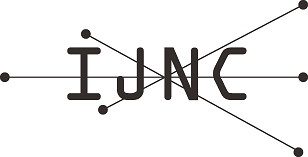Joint Optimization Method of Channel Assignment and Transmission Power for Concurrently Communicating Multiple Access-Points in Wireless Local-Area Network
Abstract
Currently, IEEE 802.11n wireless local-area network (WLAN) is popular for the Internet access due to mobility, flexibility, and scalability. Multiple access-points (APs) are often allocated in WLAN to cover the wide area, which may cause interferences and reduce the performances. Previously, we have studied the transmission power optimization method for two concurrently communicating APs to reduce interferences. It selects either the maximum or minimum power for each AP such that signal-to-noise ratio (SNR) is highest. However, it was found that the channel assignment is also important when multiple APs are closely allocated in dense WLAN. In this paper, we propose a joint optimization method of channel assignment and transmission power for concurrently communicating multiple APs in WLAN. First, the same channel is assigned to the nearby APs where the CSMA/CA protocol works well, and the most distant channels are to the other APs. Second, the transmission power is optimized by selecting the highest measured SNR. To reduce the SNR measurement load, 1) the maximum power is assigned to every AP, 2) the initial RSS from the associated host is measured, 3) the minimum power is assigned to one AP in descending order of the initial RSS, and the SNR is measured, and 4) the power combination for the highest SNR is selected. For evaluations, we conduct extensive experiments under various network topologies using up to four Raspberry Pi APs. The results show that the proposal always selects the best channel and transmission power for each AP that offers the highest throughput performance.
Keywords
WLAN; access point; Raspberry Pi; channel assignment; transmission power optimization; SNR; multiple APs
Full Text:
PDFRefbacks
- There are currently no refbacks.
